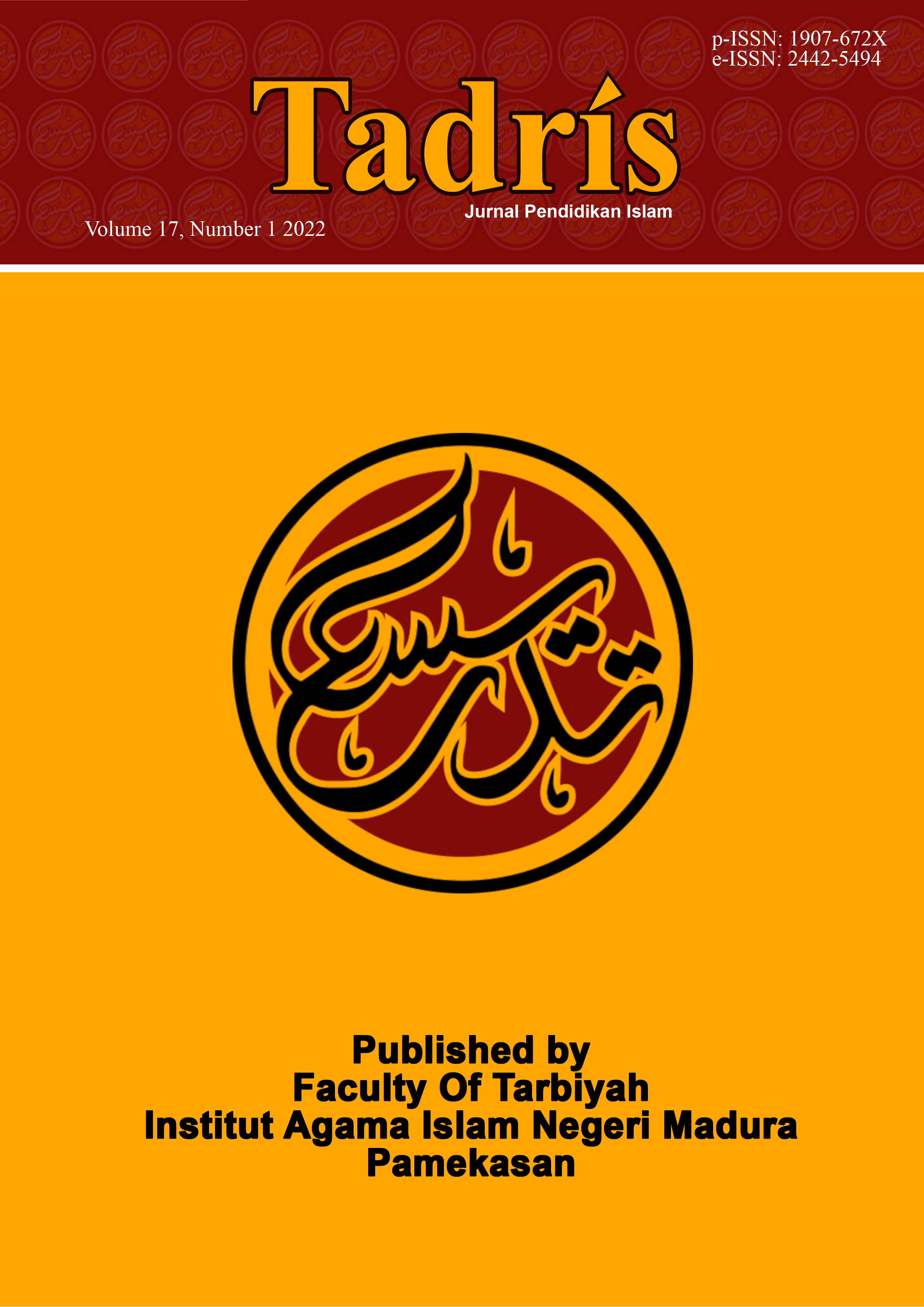Islamic Boarding School Education as a National Multicultural Education Role Model
 Abstract views: 187
,
Abstract views: 187
,
 PDF downloads: 200
PDF downloads: 200
Abstract
Pesantren is an institution that has inherited the nation's values, culture, and character, so it has a significant role in preserving multicultural values to build the unity and integrity of the Indonesian nation. This study aims to reveal the implementation of multicultural education in Islamic boarding schools as a commitment to maintaining and respecting ethnic, ethnic, and cultural diversity. This study uses a qualitative approach with the type of library research so that the data source comes from literature, books, and scientific articles. The results of this study indicate that the education system implemented in Islamic boarding schools has characteristics compared to public educational institutions. The educational values carried are also in line with and uphold the values of multicultural education as a manifestation of the life view of the pesantren community. Pesantren education, full of multicultural values, can be used as a role model for national education because the education applied in pesantren contains fundamental values in multicultural education. In addition, Islamic boarding school education is not only oriented to cognition, where knowledge and intellectuality are the main orientations in the educational paradigm. Instead, it emphasizes the development of human beings who have character, morality, human values, compassion, courtesy, and peace. The existence of diverse santri requires that the pesantren environment be designed inclusively by upholding the value of diversity and difference. A culture of mutual respect and respect for differences is an important thing to do in order to avoid the potential for significant conflicts on racial issues.
Downloads
References
Sartika, Dewi, dkk, “Pengaruh Penerapan Pendidikan Multikultural Terhadap Sikap Dan Toleransi”, Jurnal Edueksos ,Vol. IX, No. 1, (Juni, 2020).
Oktavia, Nur Isna dan Supriadi Torro, “Pengaruh Pendidikan Multikultural Terhadap Tingkat Toleransi Beragama Mahasiswa Pendidikan Sosiologi Universitas Negeri Makassar”, Pinisi Journal Of Sociology Education Review; Vol. 1, No. 2, (Juli, 2021).
Najmina, Nana. “Pendidikan Multikultural Dalam Membentuk Karakter Bangsa Indonesia”, Jurnal Pendidikan Ilmu-Ilmu Sosial, Vol. 10, No. 1, (2018).
Sukardi, Metodologi Penelitian Pendidikan: Kompetensi dan Praktiknya. Jakarta: Bumi Aksara, 2020.
Moleong, Lexy J., Penelitian Kualitatif. Bandung: PT. Remaja Rosdakarya, 2018.
Dhofier, Zamakhsyari. Tradisi Pesantren: Studi Tentang Pandangan Hidup Kiai. Jakarta: LP3ES, 1990.
Abdullah, Amin. Falsafah Kalam di Era Posmodernisme. Yogyakarta: Pustaka Pelajar, 1995.
Ismail SM, “Pengembangan Pesantren Tradisional: Sebuah Hipotesa Mengantisipasi Perubahan Sosial”, dalam Dinamika Pesantren dan Madrasah. Yogyakarta: Pustaka Pelajar, 2002.
Undang-Undang Republik Indonesia Nomor 20 Tahun 2003 Tentang Sistem Pendidikan Nasional Pasal 1 Ayat 2.
Undang-Undang Republik Indonesia Nomor 20 Tahun 2003 Tentang Sistem Pendidikan Nasional Pasal 3.
Indrapangastuti, Dewi. “Praktek Dan Problematik Pendidikan Multikultural Di SMK”, Jurnal Pembangunan Pendidikan: Fondasi dan Aplikasi, Vol. 2, No. 1, (2014).
Zulhimma, “Dinamika Perkembangan Pondok Pesantren Di Indonesia”, Jurnal Darul ‘Ilmi, Vol. 01, No. 02, (2013).
Fathoni, Muhammad Anwar dan Ade Nur Rohim, “Peran pesantren dalam Pemberdayaan Ekonomi Umat di Indonesia, “Conference on Islamic Management, Accounting, and Economics (CIMAE) Proceeding. Vol. 2, 2019.
Aly, Abdullah. Pendidikan Islam Multikultural di Pesantren. Yogyakarta: Pustaka Pelajar, 2011.
Fauzi, Ahmad. “Core Values Satlogi santri di Pesantren Zainul Hasan Genggong Dalam Tantangan Globalisasi”, Prosiding Seminar Nasional & Temu Ilmiah Jaringan Peneliti, ISBN : 978-602-50015-0-5.
Baharun, H., Management Of Quality Education In Pesantren: The study of the Education Quality Improvement Pesantren by Strategy Management Approach. Malang: 2nd International Conferences On Education And Training (ICET), UM Malang, (2016).
Zulqarnain, “Penanaman Nilai-nilai Pendidikan Multikultural di Pondok Pesantren D DI-AD Mangkoso Barru Sulawesi Selatan”, Jurnal Al-Thariqah, Vol. 1, No. 2, (Desember, 2016).
Syafi’ie, Imam. “Pondok Pesantren: Lembaga Pendidikan Pembentukan Karakter”, Al-Tadzkiyyah: Jurnal Pendidikan Islam, Volume 8, (Mei, 2017).
Abu Bakar Ahmad Ibn al-Husayn Ibn 'Ali al-Bayhaqiy, Sunan al-Bayhaqiy. Juz 2.
Q.S. Al-Qalam (68: 4)
Assegaf, Abd. Rahman. Filsafat Pendidikan Islam. Jakarta: Rajawali Press 2011.
Susanti, Rini Dwi. “Menguak Multikulturalisme Di Pesantren: Telaah atas Pengembangan Kurikulum, ADDIN, Vol. 7, No. 1, (Februari, 2013).
Zainuddin, M., “Paradigma Pendidikan Islam Holistik”, Ulumuna: Journal Of Islamic Studies, Vol. 15, No. 1, (Juni, 2011).
Khozin, Khazanah Pendidikan Agama Islam. Bandung: PT Remaja Rosdakarya, 2013.
Mita Silfiyasari dan Ashif Az Zhafi, “Peran Pesantren dalam Pendidikan Karakter di Era Globalisasi”, Jurnal Pendidikan Islam Indonesia, Vol. 5, No. 1, (Oktober, 2020).
Satori, Akhmad dan Wiwi Widiastuti, “Model Pendidikan Multikultural Pada Pesantren Tradisional Di Kota Tasikmalaya Dalam Mencegah Ancaman Radikalisme,” Jurnal Ilmu-Ilmu Sosial Dan Humaniora, Vol. 20, No. 1, (2018).
Astut, Fakhriyah Tri, dkk, “Pesantren Dalam Menjaga Keberagaman Masyarakat Indonesia: Penelitian Di Pondok Pesantren Daar El Qolam 3 Tangerang Banten” At-Thullab Jurnal Mahasiswa Studi Islam, Vol.2, No. 1, (September-Januari, 2021).
Copyright (c) 2022 TADRIS: Jurnal Pendidikan Islam

This work is licensed under a Creative Commons Attribution-NonCommercial 4.0 International License.
The journal operates an Open Access policy under a Creative Commons Non-Commercial 4.0 International license. Authors who publish with this journal agree to the following terms:
- Authors retain copyright and grant the journal right of first publication with the work simultaneously licensed under a
 Commons Attribution-NonCommercial 4.0 International License
Commons Attribution-NonCommercial 4.0 International Licensethat allows others to share — copy and redistribute the material in any medium or format, and adapt — remix, transform, and build upon the material.
- Authors are able to enter into separate, additional contractual arrangements for the non-exclusive distribution of the journal's published version of the work (e.g., post it to an institutional repository or publish it in a book), with an acknowledgement of its initial publication in this journal.
- Authors are permitted and encouraged to post their work online (e.g., in institutional repositories or on their website) prior to and during the submission process, as it can lead to productive exchanges, as well as earlier and greater citation of published work (see The Effect of Open Access).














